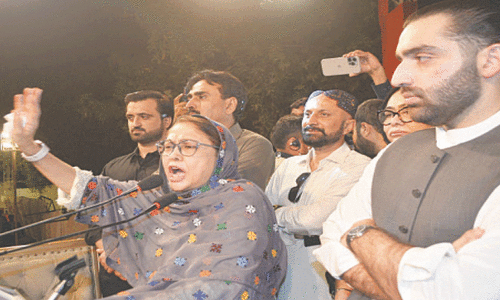 KARACHI, Aug 25: A large number of factories associated with the informal recycling industry in the city burn plastic in residential areas and release hazardous fumes into the air.
KARACHI, Aug 25: A large number of factories associated with the informal recycling industry in the city burn plastic in residential areas and release hazardous fumes into the air.
While the people worst affected by the burning of tons of plastic every day are the workforce employed at such factories – where no protective gear is employed – the fumes released into the air are said to cause respiratory disorders among the residents of the neighbourhood.
And yet no study has been carried out by the provincial protection environment protection agency to find out what impact the presence of such factories in the city’s residential areas have on not only the health of the residents but also on the environment.
This reporter paid visits to a couple of such factories in the city and learnt that polythene bags of various sizes and colours are acquired from garbage-pickers, mostly Afghan boys, who are paid by the kilo either by the factories or by the person they work for. The scavengers receive around Rs3 for a kilo of plastic bags collected by them. The amount is paid either directly to them or to their families when they return home after working in the city for a couple of months.
The polythene bags thus collected are then sorted out. The ones that are used as shopping bags are separated from the ones used in packaging. The bags are then made to pass through various locally manufactured machines which melt plastic and then turn it first into vermicelli-like sticks and then into granules. These granules are then sold to factories in Korangi and Shershah where plastic goods and polythene bags are again made from them.
This reporter saw workmen in one such factory in Shireen Jinnah Colony handle red-hot molten plastic with bare hands. When the owner of the factory, where around 250 kilos of plastic is melted every day, was asked as to why no protective gear is made available to the workers, he said the 15 labourers working in his small-time establishment were too poor to worry about environmental issues and even their own health.
He said that he obtains plastic from a contractor, who in turn employs boys that collect refuse all over the city. (The sorting out of the garbage – plastic, paper and iron – takes place at the contractor’s place.) He said the rate at which he bought plastic from the contractor ranged between Rs15 a kilo to Rs25 a kilo – depending on its thickness and quality. He sold the granules produced at his factory after adding around Rs7 production cost and Rs4-Rs5 per kilo profit. He insisted that the fumes rising from his factory posed no health risk to the residents of the locality.
However, Dr Moazzam Ali Khan of the Institute of Environment Studies, Karachi University, told this reporter that dioxin, which is highly carcinogenic, is released into the air when plastic is burnt.
“Such factories, if they must be established, should be located 20 to 25 kilometres away from the city. The fumes released by plastic burning should not be allowed to escape into the air.”
He said that in the civilised world there was a ban on burning plastic openly.
When the Director-General of the Sindh Environment Protection Agency, Dr Mohammad Ali Shaikh, was asked to comment on the recycling of plastic by burning, he said he had no knowledge on the subject. “I know hardly anything about it. I am new to the department and since my takeover I have been busy with a project on noise pollution.”
However, the Sepa Deputy Director, Naeem Mughal, told this reporter that no research had been conducted by Sepa on such plastic recycling. “We are unable to do it because we are short-staffed and face financial constraints. Therefore, we focus only on large industries and factories.”
He said that out of the 8,000 to 10,000 tonnes of solid waste generated by the city every day, only 30 to 40 per cent is collected and disposed of by the city government. The rest of the garbage is collected by pickers who sell it to the informal recycling industry.












































